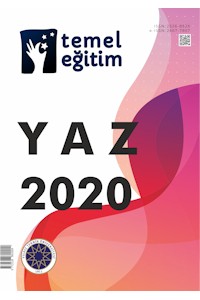Abstract
References
- Adair, J. (2000). Karar verme ve problem çözme (N. Kalaycı,Trans.). Ankara: Gazi Kitabevi.
- Akgündüz, D. (2018). Okul öncesinden üniversiteye kuram ve uygulamada stem. Ankara: Anı Yayıncılık.
- Akyüz, G., & Pala, N. M. (2010). PISA 2003 sonuçlarına göre öğrenci ve sınıf özelliklerinin matematik okuryazarlığına ve problem çözme becerilerine etkisi [The effect of student and class characteristics on mathematical literacy and problem solving in accordance with pisa 2003 results]. İlköğretim Online, 9(2), 668–678. Retrieved from http://ilkogretim-online.org.tr/index.php/io/article/view/1807/1643 on 25.07.2019.
- Altun, M. (1998). Matematik öğretimi. Bursa: Alfa Yayınları.
- Baki, A. (2003). What to teach and how to teach in school mathematics?. Mathematicians Bulletin, 2, 13-16.
- Baykul, Y. (2006). İlköğretime matematik öğretimi. Ankara: Pegem A Yayınları.
- Çaycı, B., & Kılıç, R. (2017). The relationship between the academic achievement of primary school students and the science-mathematics attitudes and basic skill levels. International Congress of Eurasian Social Sciences, 8 (28).
- Duman, A. (2006). İlköğretim öğrencilerinin matematik başarısını etkileyen faktörlerin öğrenciler ve öğretmenler açısından değerlendirilmesi (Eskişehir ili Örneği). (Master’s thesis). Osmangazi University, Eskişehir.
- Duran, C., Sidekli, S., & Yorulmaz, A. (2018). İlkokul dördüncü sınıf öğrencilerinin matematik etkinliklerine yönelik tutumlarının incelenmesi [Investigation of the elementary school fourth grade students’ attitudes towards math activities]. İnternational Primary Educational Journal, 2(1), 17-26.
- Ekici,B., & Demir, M.K. (2018). İlkokul 4. sınıf öğrencilerinin dört işlem problemlerini çözerken yaptıkları matematiksel hatalar [The mathematical errors on word problems made by 4th grades]. Eğitimde Kuram ve Uygulama,14(1), 61-20. DOI:10.17244/eku.338880
- Fraser, B., & Butts, W.L. (1982). Relationship between perceived levels of classroom individualization and science-related attitudes. Journal of Research in Science Teaching, 19, 143-154.
- Gökkurt, B., Örnek, T., Hayat, T., & Soylu, Y. (2015). Öğrencilerin problem çözme ve problem kurma becerilerinin değerlendirilmesi [Assessing students’ problem-solving and problem-posing skills]. Bartın Üniversitesi Eğitim Fakültesi Dergisi, 4 (2), 751-774. DOI: 10.14686/buefad.v4i2.5000145637
- Haylock, D., & Cockburn, A. (2003). Understanding mathematics in the lower primary years. London: Paul Chapman Publishing.
- Ismail, N. A., & Awang, H. (2008). Assessing the effects of students' characteristics and attitudes on mathematics performance. Problems of Education in the 21st Century, 9, 34-90.
- Katrancı, Y., & Şengül, S. (2019). The relationship between middle school students’ attitudes towards mathematical problem-posing, attitudes towards mathematical problem-solving, and attitudes towards mathematics. Education and Science, 44 (197), 1-24. DOI: 10.15390/EB.2019.7315
- Kılıçkaya, M., & Toptaş, V. (2017). Problem çözme: literatür incelemesi [Problem-solving: literature review]. International Journal of Education Technology and Scientific Researches, 2 (2), 20-31.
- Lester, F. K., & Charles, R. I. (2003). Teaching mathematics through problem-solving: pre-k to 6. Reston, VA: NCTM.
- Mason, L. (2003). High school students ‘beliefs about maths, mathematical problem-solving, and their achievement in maths: a crossection study. Educational Psychology, 23 (1), 73-85. https://doi.org/10.1080/01443410303216
- MEB (2016a). TIMSS 2015 ulusal matematik ve fen bilimleri ön raporu 4. ve 8. sınıflar. Ankara: MEB Yayını. Retrieved from http://timss.meb.gov.tr/wp-content/uploads/TIMSS_2015_Ulusal_Rapor.pdf on 28.08.2019
- MEB (2016b). PISA 2015 Ulusal Raporu. Ankara. Retrieved from http://odsgm.meb.gov.tr/test/analizler/docs/PISA/PISA2015_Ulusal_Rapor.pdf on 16.11.2018.
- MEB (2016c). PISA 2012 Ulusal Nihai Rapor. Ankara. Retrieved from http://pisa.meb.gov.tr/wp-content/uploads/2013/12/pisa2012-ulusal-on-raporu.pdf on 15.11. 2018.
- MEB (2018). Matematik dersi öğretim programı. Ankara. Retrieved from http://mufredat.meb.gov.tr/Dosyalar/201813017165445MATEMAT%C4%B0K%20%C3%96%C4%9ERET%C4%B0M%20PROGRAMI%202018v.pdf on 14.11.2018.
- Organization for Economic Co-operation and Development (OECD). (2003). The PISA 2003 assessment framework – mathematics, reading, science and problem-solving, knowledge, and skills. Paris: OECD Publishing.
- Özgen, K., Ay, M., Kılıç, Z., Özsoy, G., & Alpay, F. (2017). Ortaokul öğrencilerinin öğrenme stilleri ve matematiksel problem çözmeye yönelik tutumlarının incelenmesi. Mehmet Akif Ersoy Üniversitesi Eğitim Fakültesi Dergisi, 1 (41), 215-244. DOI: 10.21764/efd.55023
- Özsoy, G. (2005). The relationship between problem-solving skills and mathematical achievement. Gazi Unıvesity Journal of Gazi Education Faculty, 25 (3), 179-190. Retrieved from http://www.gefad.gazi.edu.tr/tr/download/article-file/77235 on 24.08.2019. Papanastasiou, C. (2000). Effects of attitudes and beliefs on mathematics achievement. Studies in Educational Evaluation, 26(1), 27-42. https://doi.org/10.1016/S0191-491X(00)00004-3
- Piht, S., & Eisenschmidt, E. (2008). Pupils' attitudes toward mathematics: comparative research between Estonian and Finnish practice schools. Problems of Education in the 21st Century, 9, 97-106.
- Polya, G. (1990). How to solve It? (F. Halatçı, Trans.). New York.
- Robson, C. (2017). Bilimsel araştırma yöntemleri: gerçek dünya araştırmaları. (Ş. Çınkır & N. Demirkasımoğlu, Trans.). Ankara: Anı Yayıncılık.
- Schommer-Aikins, M., Duell, O. K., & Hutter, R. (2005). Epistemological beliefs, mathematical problem-solving beliefs, and academic performance of middle school students. The Elementary School Journal, 105(3), 289-304. DOI:10.1086/428745
- Tavşancıl, E. (2005). Tutumların ölçülmesi spss veri analizi. Ankara: Nobel Yayınları.
- Uysal, O. (2007). İlköğretim İkinci Kademe Öğrencilerinin Matematik Dersine Yönelik Problem Çözme Becerileri, Kaygıları ve Tutumları Arasındaki İlişki. (Master’s thesis). Dokuz Eylül University, İzmir.
- Van de Walle, J. A., Karp, K. S., & Williams, J. M. B. (2016). Elementary and middle school mathematics: Teaching developmentally (9th ed.). New York, NY: Pearson Education.
- Yazgan, Y. (2007). Observations about the non-routine problem-solving strategies of fourth and fifth-grade students. Elementary Education Online, 6(2), 249–263. Retrieved from http://ilkogretim-online.org.tr/index.php/io/article/view/1928/1764 on 29.08.2019.
- Yıldızlar, M. (2001). Methods of solving mathematical problems. Ankara: Eylül.
- Yücel, Z., & Koç, M. (2011). The relationship between the prediction level of elementary school students’ math achievement by their math attitudes and gender. Elementary Education Online, 10 (1), 133-143. Retrieved from http://ilkogretim-online.org.tr/index.php/io/article/view/1655/1491 on 28.08.2019.
Abstract
This paper main aims to determine how students' attitudes towards mathematics course affect problem-solving processes during a real mathematical problem-solving activity. Besides, the students’ ability to use problem-solving steps and strategies are also revealed in this study. For the purposes of the research, the following questions are answered:” How do 4th-grade students' attitudes towards mathematics?”, “How do 4th-grade students’ success in mathematics tests?”, “Do the students have knowledge of problem-solving strategies and problem-solving steps?”, “Is there a relation between mathematics attitudes and problem-solving success?”. The research was carried out with 100 randomly selected 4th-grade students in a primary school in Istanbul. A mixed research method was used. The data were collected by using two different sources. “Attitude Scale towards Mathematics Course” scale which is included in the 4th Grade Mathematics Teacher Guide Book was used to determine the students’ attitudes. A worksheet (test) prepared was used to assess students’ problem-solving success. There are a total of 10 mathematical problems in the test. The data both from the test and the attitude scale were analysed. Based on the findings, it was found that the students’ attitudes towards mathematics were generally positive. However, no statistically significant relation was found between the positive attitude towards mathematics and problem-solving achievements. Besides, this study explores that the students used a limited number of problem-solving strategies. They performed usually the application step of a problem-solving process.
Keywords
References
- Adair, J. (2000). Karar verme ve problem çözme (N. Kalaycı,Trans.). Ankara: Gazi Kitabevi.
- Akgündüz, D. (2018). Okul öncesinden üniversiteye kuram ve uygulamada stem. Ankara: Anı Yayıncılık.
- Akyüz, G., & Pala, N. M. (2010). PISA 2003 sonuçlarına göre öğrenci ve sınıf özelliklerinin matematik okuryazarlığına ve problem çözme becerilerine etkisi [The effect of student and class characteristics on mathematical literacy and problem solving in accordance with pisa 2003 results]. İlköğretim Online, 9(2), 668–678. Retrieved from http://ilkogretim-online.org.tr/index.php/io/article/view/1807/1643 on 25.07.2019.
- Altun, M. (1998). Matematik öğretimi. Bursa: Alfa Yayınları.
- Baki, A. (2003). What to teach and how to teach in school mathematics?. Mathematicians Bulletin, 2, 13-16.
- Baykul, Y. (2006). İlköğretime matematik öğretimi. Ankara: Pegem A Yayınları.
- Çaycı, B., & Kılıç, R. (2017). The relationship between the academic achievement of primary school students and the science-mathematics attitudes and basic skill levels. International Congress of Eurasian Social Sciences, 8 (28).
- Duman, A. (2006). İlköğretim öğrencilerinin matematik başarısını etkileyen faktörlerin öğrenciler ve öğretmenler açısından değerlendirilmesi (Eskişehir ili Örneği). (Master’s thesis). Osmangazi University, Eskişehir.
- Duran, C., Sidekli, S., & Yorulmaz, A. (2018). İlkokul dördüncü sınıf öğrencilerinin matematik etkinliklerine yönelik tutumlarının incelenmesi [Investigation of the elementary school fourth grade students’ attitudes towards math activities]. İnternational Primary Educational Journal, 2(1), 17-26.
- Ekici,B., & Demir, M.K. (2018). İlkokul 4. sınıf öğrencilerinin dört işlem problemlerini çözerken yaptıkları matematiksel hatalar [The mathematical errors on word problems made by 4th grades]. Eğitimde Kuram ve Uygulama,14(1), 61-20. DOI:10.17244/eku.338880
- Fraser, B., & Butts, W.L. (1982). Relationship between perceived levels of classroom individualization and science-related attitudes. Journal of Research in Science Teaching, 19, 143-154.
- Gökkurt, B., Örnek, T., Hayat, T., & Soylu, Y. (2015). Öğrencilerin problem çözme ve problem kurma becerilerinin değerlendirilmesi [Assessing students’ problem-solving and problem-posing skills]. Bartın Üniversitesi Eğitim Fakültesi Dergisi, 4 (2), 751-774. DOI: 10.14686/buefad.v4i2.5000145637
- Haylock, D., & Cockburn, A. (2003). Understanding mathematics in the lower primary years. London: Paul Chapman Publishing.
- Ismail, N. A., & Awang, H. (2008). Assessing the effects of students' characteristics and attitudes on mathematics performance. Problems of Education in the 21st Century, 9, 34-90.
- Katrancı, Y., & Şengül, S. (2019). The relationship between middle school students’ attitudes towards mathematical problem-posing, attitudes towards mathematical problem-solving, and attitudes towards mathematics. Education and Science, 44 (197), 1-24. DOI: 10.15390/EB.2019.7315
- Kılıçkaya, M., & Toptaş, V. (2017). Problem çözme: literatür incelemesi [Problem-solving: literature review]. International Journal of Education Technology and Scientific Researches, 2 (2), 20-31.
- Lester, F. K., & Charles, R. I. (2003). Teaching mathematics through problem-solving: pre-k to 6. Reston, VA: NCTM.
- Mason, L. (2003). High school students ‘beliefs about maths, mathematical problem-solving, and their achievement in maths: a crossection study. Educational Psychology, 23 (1), 73-85. https://doi.org/10.1080/01443410303216
- MEB (2016a). TIMSS 2015 ulusal matematik ve fen bilimleri ön raporu 4. ve 8. sınıflar. Ankara: MEB Yayını. Retrieved from http://timss.meb.gov.tr/wp-content/uploads/TIMSS_2015_Ulusal_Rapor.pdf on 28.08.2019
- MEB (2016b). PISA 2015 Ulusal Raporu. Ankara. Retrieved from http://odsgm.meb.gov.tr/test/analizler/docs/PISA/PISA2015_Ulusal_Rapor.pdf on 16.11.2018.
- MEB (2016c). PISA 2012 Ulusal Nihai Rapor. Ankara. Retrieved from http://pisa.meb.gov.tr/wp-content/uploads/2013/12/pisa2012-ulusal-on-raporu.pdf on 15.11. 2018.
- MEB (2018). Matematik dersi öğretim programı. Ankara. Retrieved from http://mufredat.meb.gov.tr/Dosyalar/201813017165445MATEMAT%C4%B0K%20%C3%96%C4%9ERET%C4%B0M%20PROGRAMI%202018v.pdf on 14.11.2018.
- Organization for Economic Co-operation and Development (OECD). (2003). The PISA 2003 assessment framework – mathematics, reading, science and problem-solving, knowledge, and skills. Paris: OECD Publishing.
- Özgen, K., Ay, M., Kılıç, Z., Özsoy, G., & Alpay, F. (2017). Ortaokul öğrencilerinin öğrenme stilleri ve matematiksel problem çözmeye yönelik tutumlarının incelenmesi. Mehmet Akif Ersoy Üniversitesi Eğitim Fakültesi Dergisi, 1 (41), 215-244. DOI: 10.21764/efd.55023
- Özsoy, G. (2005). The relationship between problem-solving skills and mathematical achievement. Gazi Unıvesity Journal of Gazi Education Faculty, 25 (3), 179-190. Retrieved from http://www.gefad.gazi.edu.tr/tr/download/article-file/77235 on 24.08.2019. Papanastasiou, C. (2000). Effects of attitudes and beliefs on mathematics achievement. Studies in Educational Evaluation, 26(1), 27-42. https://doi.org/10.1016/S0191-491X(00)00004-3
- Piht, S., & Eisenschmidt, E. (2008). Pupils' attitudes toward mathematics: comparative research between Estonian and Finnish practice schools. Problems of Education in the 21st Century, 9, 97-106.
- Polya, G. (1990). How to solve It? (F. Halatçı, Trans.). New York.
- Robson, C. (2017). Bilimsel araştırma yöntemleri: gerçek dünya araştırmaları. (Ş. Çınkır & N. Demirkasımoğlu, Trans.). Ankara: Anı Yayıncılık.
- Schommer-Aikins, M., Duell, O. K., & Hutter, R. (2005). Epistemological beliefs, mathematical problem-solving beliefs, and academic performance of middle school students. The Elementary School Journal, 105(3), 289-304. DOI:10.1086/428745
- Tavşancıl, E. (2005). Tutumların ölçülmesi spss veri analizi. Ankara: Nobel Yayınları.
- Uysal, O. (2007). İlköğretim İkinci Kademe Öğrencilerinin Matematik Dersine Yönelik Problem Çözme Becerileri, Kaygıları ve Tutumları Arasındaki İlişki. (Master’s thesis). Dokuz Eylül University, İzmir.
- Van de Walle, J. A., Karp, K. S., & Williams, J. M. B. (2016). Elementary and middle school mathematics: Teaching developmentally (9th ed.). New York, NY: Pearson Education.
- Yazgan, Y. (2007). Observations about the non-routine problem-solving strategies of fourth and fifth-grade students. Elementary Education Online, 6(2), 249–263. Retrieved from http://ilkogretim-online.org.tr/index.php/io/article/view/1928/1764 on 29.08.2019.
- Yıldızlar, M. (2001). Methods of solving mathematical problems. Ankara: Eylül.
- Yücel, Z., & Koç, M. (2011). The relationship between the prediction level of elementary school students’ math achievement by their math attitudes and gender. Elementary Education Online, 10 (1), 133-143. Retrieved from http://ilkogretim-online.org.tr/index.php/io/article/view/1655/1491 on 28.08.2019.
Details
| Primary Language | English |
|---|---|
| Subjects | Studies on Education |
| Journal Section | Araştırma Makaleleri |
| Authors | |
| Publication Date | July 15, 2020 |
| Submission Date | August 11, 2020 |
| Published in Issue | Year 2020 Volume: 2 Issue: 3 |




 No APCs or Submission Charges
No APCs or Submission Charges